By Dr. Nallely Ibarra / March 28, 2022
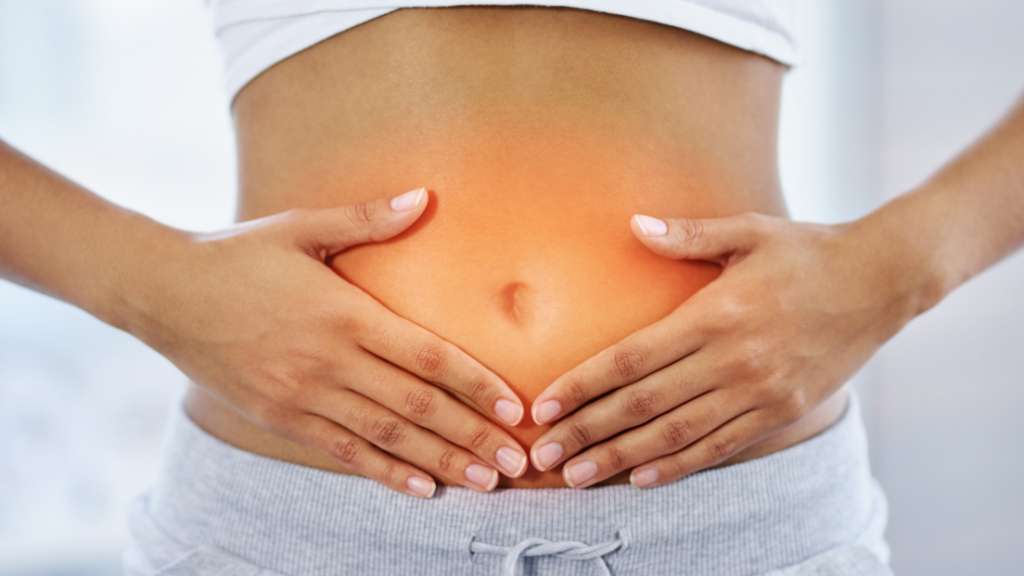
This article is a continuation of this article
Irritable bowel syndrome (IBS) is a gastrointestinal diagnosis given to about 20% of the global population. However, it is estimated that 60-80% of these patients actually suffer from Small Intestinal Bacterial Overgrowth (SIBO).
SIBO is an overgrowth of bacteria in the small intestine.
These bacteria ferment the food we eat, and as a result, they release gasses that can lead to multiple uncomfortable symptoms.
The most common symptoms include frequent gas, bloating, belching, abdominal pain, and irregular bowel movements. However, this condition is not limited to gastrointestinal symptoms. Patients with SIBO may also experience anxiety and/or depression, acne, hormonal imbalance, fatigue, pain, among many others.
Eradicating SIBO can be complicated. Most patients will require more than one round of treatment to kill off the bacteria.
However, once a SIBO test has come back negative, it is imperative to now heal the GI tract.
First, you must initiate treatment to promote gut motility to prevent relapse, as bacteria can begin to repopulate in your small intestine two weeks after completing treatment. Often decreased motility is at the root of SIBO.
We must stimulate the migrating motor complex (MMC), a neuro-operated wave that sweeps through your intestines every 90-120 minutes to move along food and residual debris (11). Essentially, the MMC cleans the intestines.
So, how do we stimulate the MMC?
We do so by using Prokinetics. I typically recommend taking Prokinetics for a minimum of 6 months or more! Side note: prokinetics should always be taken away from food.
Second, it is essential to begin treatment to restore your intestinal lining.
Our intestinal lining is a single cell layer. It acts as a barrier (12). This barrier is commonly compromised in gut conditions like intestinal permeability, irritable bowel disease, and irritable bowel syndrome. Therefore, I frequently use herbal demulcents like Althea Officinalis, slippery elm, and the amino acid L-glutamine to restore intestinal lining.
Third, don’t forget that diet and lifestyle must be sustainably changed to ensure SIBO does not return!
While diet alone does not cure SIBO, it certainly helps with symptom management during or after treating SIBO. Different diets can be used, most commonly the Low FODMAP and Specific Carbohydrate Diet, or both. In addition, stress management is another crucial component of gut health. More will be explained towards the end of this article.
Please keep reading to review the treatments I most commonly recommend when treating SIBO.
Earlier I discussed the MMC. As I mentioned, the MMC is usually compromised in SIBO patients. Therefore, after SIBO treatment, we want to stimulate the MMC to reduce the risk of relapse, so we use prokinetics. Prokinetics are essentially agents, pharmaceutical or herbal, that promote motility.
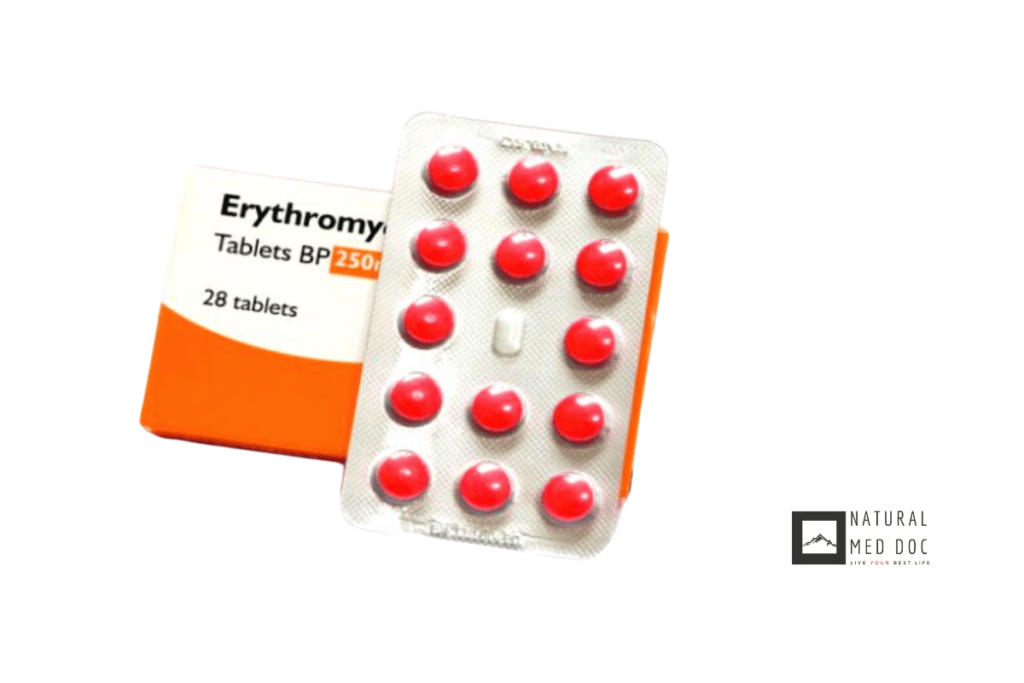
Low-Dose Erythromycin: The recommended dosage is 50 mg at bedtime. To achieve this dose, this antibiotic will need to be compounded at a compounding pharmacy (1)
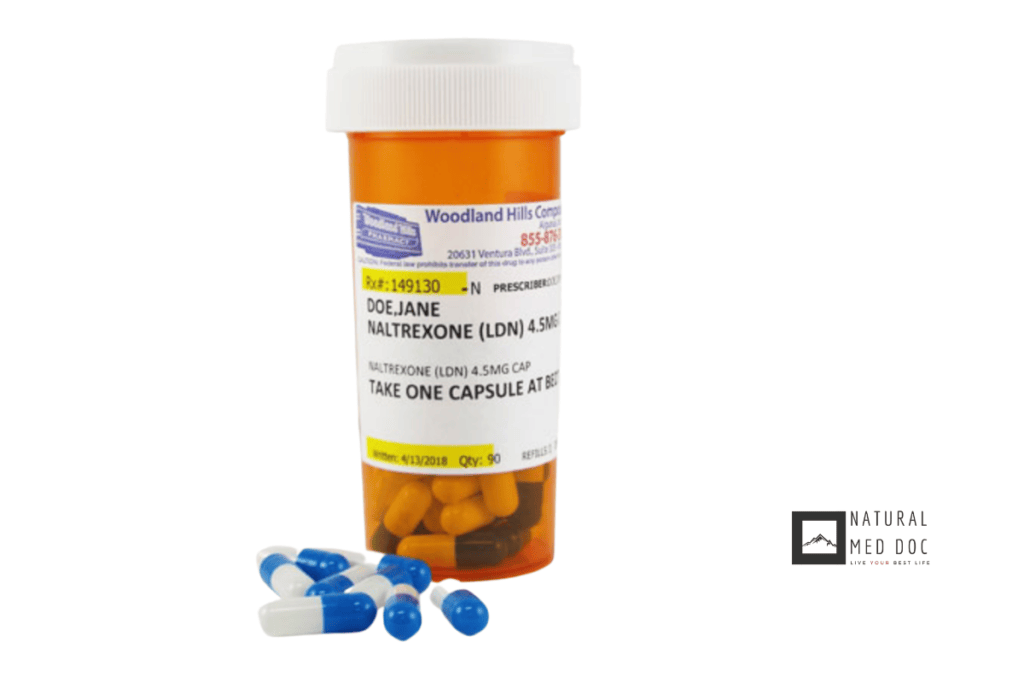
Low-Dose Naltrexone: The recommended dosage is
When using herbs to aid in digestive motility, I use herbal blends containing ginger root (2). However, taking this root can cause heartburn (also known as a ginger burn). Therefore, this may be taken in divided doses to reduce heartburn.
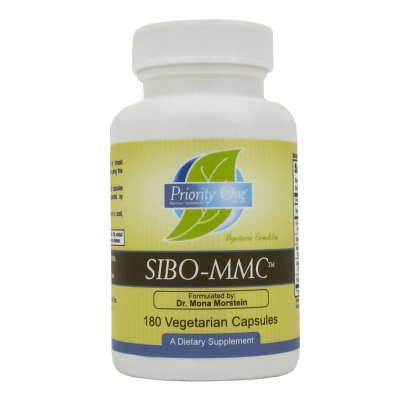
I typically recommend taking six capsules 30 minutes to one hour before bedtime to prevent the “ginger burn.” However, if the “ginger burn” persists, feel free to take three capsules during the day away from food and three capsules at bedtime.
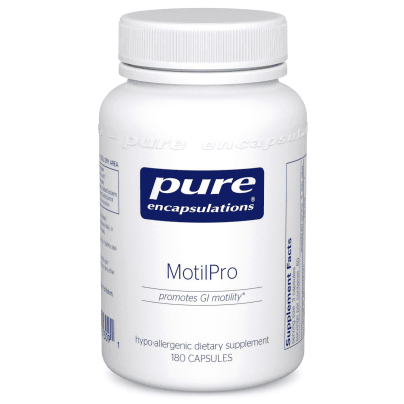
Again, I recommend taking six capsules 30 minutes to one hour before bedtime to prevent the “ginger burn.” However, if the “ginger burn” persists, feel free to take three capsules during the day away from food and three capsules at bedtime.
Spacing your meals (including snacks) to a minimum of every 3-4 hours is also recommended. This is because the MMC wave occurs every 90 minutes in the absence of food or caloric beverages. When food is introduced, even in small amounts, the process of digestion begins halting the MMC process. The MMC ensures that our food is properly absorbed and digested before the waste product is eliminated. When we disrupt the MMC, we risk the regrowth of SIBO causing bacteria.
The epithelium is a single cell layer in the intestinal tract. The epithelium’s job is to absorb nutrients, water, and electrolytes. In addition, the epithelium helps prevent microorganisms like viruses and bacteria from passing to the rest of the body. Unfortunately, this protective layer can become compromised for many reasons, such as chronic stress, food sensitivities, non-steroidal anti-inflammatories (NSAID) use, antibiotic use, etc.
Below are three of my most commonly used supplements for gut lining restoration.
Fortunately, there are minerals, amino acids, and herbs that we can use to restore the gut lining, as there are no pharmaceuticals that have this action.
Our GI Support supplement holds an incredible blend of demulcent herbs and the amino acid L-Glutamine. Earlier I mentioned that herbal demulcents like althea Officinalis and slippery elm aid in the healing process of the gut. I often describe these as herbs that help coat or seal the lining of the digestive tract. This helps soothe any intestinal irritation.
The recommended dosage is to work up to 1 tablespoon mixed in water once daily or in divided doses.

This blend has herbs, L-Glutamine, and zinc, all of which support the mucosal lining integrity. Zinc is a mineral that serves many purposes, but one of them is enhancing intestinal tight junctions and can also help with gut repair (9).
The recommended dosage is three capsules twice daily before meals.
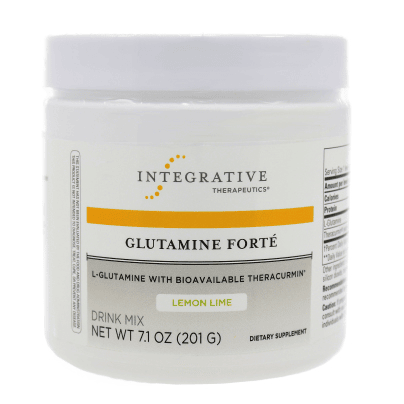
One of my personal favorite gut-healing supplements is the amino acid L-Glutamine. L-Glutamine helps maintain mucosal integrity and serves as a barrier (8)
The recommended dosage is one scoop mixed in 8-10 oz of water once to twice daily with meals.
Digestive enzymes are proteins, if you will, that support the digestion of carbohydrates, protein, fat, and fiber. Organs like the stomach, pancreas, and gallbladder naturally secrete these enzymes; however, we can further support our digestion with digestive enzymes in a supplement form. These are to be taken at the beginning of every meal, including snacks. Below you can find two of my most commonly used digestive enzymes.
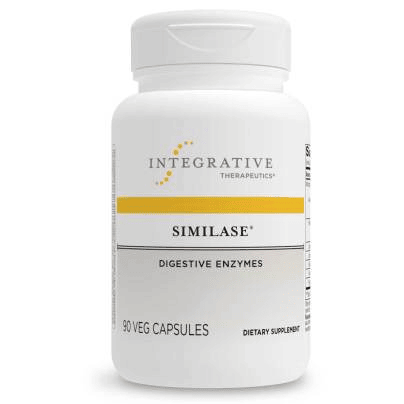
The recommended dosage is to take one capsule with snacks and two capsules with every meal.
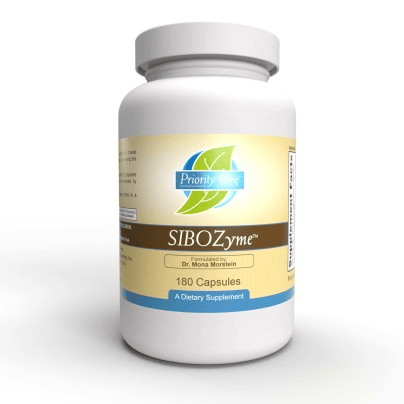
The recommended dosage is to take three capsules twice daily with meals.
Patients always ask me if probiotics help in healing SIBO. When eradicating SIBO, I advise against the use of probiotics (and prebiotics). Probiotics, in some cases, can aggravate SIBO symptoms. It is not until after SIBO eradication that I incorporate the probiotics. Probiotics help with transient repopulation of beneficial bacteria that aid in digestive processes.
The recommended dosage is one capsule once daily with a meal.
Stress is evil. I know it may seem like everything is chalked up to stress nowadays, but the reality is that stress is a significant hindrance to good health. Therefore, stress management becomes critical when supporting our well-being and preventing SIBO relapse.
Stress may decrease gut motility (6) and hydrochloric acid secretion.
What is stressing you out? Your job? Your health? Your family? What are you doing now to create change in what is stressing you out?
Stress management can look different for everyone. A few of my personal favorite ways to distress and recenter myself are prayer, reading, and exercise. However, other well-researched methods include yoga and meditation. Maybe painting or playing an instrument can be your distressing activity if you’re artistic. Choose something that makes you happy!
I frequently hear from patients that they don’t have time for these practices. But can I assure you that even 10-15 minutes of your daily day that is spent practicing any of these options can make a significant impact on your health!
Here at Natural Med Doc, we have challenged and encouraged our patients to take 10 minutes a day to practice meditation using the free app called Calm. As a result, many of them have reaped the benefits!
Invest in your health, and soon enough, your body will thank you!
After the SIBO diagnosis has been made, oftentimes, my patients ask if diet can help.
Diet can certainly help!
A diet helps manage symptoms. You may notice an improvement in the gas and the bloating. However, diet does not kill microorganisms. Unfortunately, the bugs causing the problem will still be there.
Because bacteria primarily feed on carbohydrates, the recommended diets are low in carbohydrates and are designed to starve the bacteria but feed the person.
It is essential to understand that there is no one right diet. Each diet can be customized to the patients’ needs.
Each diet has an incredible amount of detail and variation.
You can find great resources on SIBO friendly diets on SIBO specialist Dr. Allison Siebecker’s Website! https://www.siboinfo.com/diet.html and also on SIBO expert Dr. Nirala Jacobi’s Website! https://www.thesibodoctor.com/sibo-bi-phasic-diet-free-downloads/
By now, you have probably realized that there are a lot of layers to healing SIBO. But the good news is that once you have a diagnosis, you can start working towards a resolution! For me, treating my SIBO was life-changing.
If you’ve been diagnosed with IBS or suspect SIBO, don’t wait any longer to book an appointment with our doctors at Natural Med Doc! You deserve to live a healthy life.
So much can change when you have a healthy digestive system!
References:
Dr. Ibarra is a naturopathic primary care physician. She received her medical degree from Southwest College of Naturopathic Medicine and B.S. in Human Nutrition from Arizona State University.
She has experience with both conventional and naturopathic medicine. In addition, she speaks fluent Spanish.
Through her own healing journey, Dr. Ibarra brings a wealth of knowledge in gastrointestinal conditions such as IBS and SIBO.
Additional focus includes thyroid health, anxiety, and hormone balancing. She is passionate about helping her patients find and overcome the obstacles in their health.
She spends her spare time hanging out with her twin sister outdoors, serving at her local church, learning Portuguese, and reading the latest medical trends and dietary protocols to assist her patients’ health.